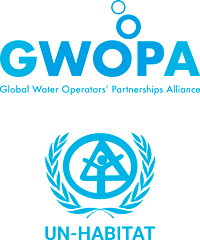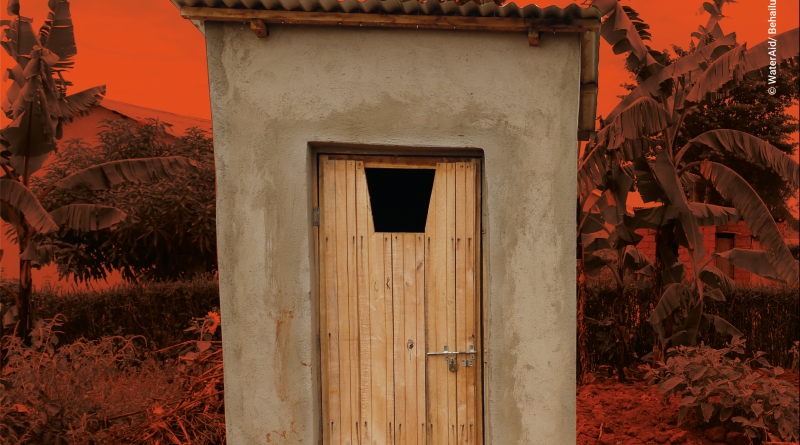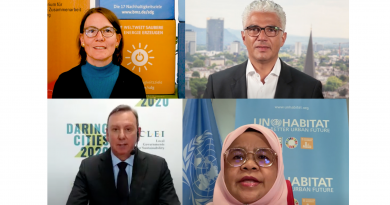World Toilet Day 2020 underlines link between sustainable sanitation and climate action
While raising awareness of the 4.2 billion people living without access to safely managed sanitation, World Toilet Day 2020 calls for bold action on toilets to help fight climate change.
Bonn, Germany, November 19th, 2020 – Today marks the 8th edition of World Toilet Day, the international observance that reminds us of the critical role of sanitation and toilets for our wellbeing and health. This year’s theme, Sustainable Sanitation and Climate Change, sees a strong focus on the environmental impact of sanitation and makes the case for increasing action on sustainable sanitation and climate action.
On this World Toilet Day, UN Water – including UN agencies and partners – calls for both mitigation and adaptation measures in sanitation services while further highlighting how toilets and waste treatment keep communities healthy and functioning.
4.2 billion people – that is most of the world’s population – still do not have access to sanitation systems that keep them safe from disease. If current trends continue, between 2030 and 2050, a quarter of a million additional deaths per year are predicted due to climate change – many of these deaths will be related to preventable diseases linked to poor sanitation.[1]
Climate change exacerbates the sanitation challenge in various ways. Rising heat, sea-levels and extreme weather can damage vulnerable sanitation infrastructure such as toilets, septic tanks, sewerage networks and treatment facilities. Whether the result of climate change or other factors, it is the poor who bear the brunt of failings to address the sanitation gap. This is most stark in the world’s informal settlements where physical and social conditions amplify the threat of disease transmission and other risks to safety in the absence of proper toilets. These same areas are most vulnerable to the threats of climate change.
But the connection between sanitation and climate action can be virtuous. Effective climate action should seek to improve or promote inclusive sanitation systems as a key ingredient to building resilience. Similarly, inclusive and holistic sanitation systems can boost wellbeing for the poor while offering more efficient processes and energy production opportunities.
From operators to local governments to regulators, many of key actors are struggling to face the challenges presented by climate change while also striving to increase equal and sustainable services for all. Strengthening the capacity of local governments and water and sanitation utilities is key to equal and sustainable sanitation services for all. As a broad alliance of water and sanitation operators and their partners, the GWOPA network, led by UN-Habitat, is committed to supporting public operators to improve water and sanitation services through not-for-profit peer partnerships (WOPs).
To date, WOPs have helped local governments and service providers around the world tackle sanitation challenges by strengthening the skills and employment opportunities of frontline sanitation workers, and helping utilities adopt fecal sludge and wastewater treatment approaches that are more environmentally sound. Example include: SIAAP (public operator in France) and ONEE (public operator in Morocco), and BCASA (public operator in Barcelona) and WSSA (public operator in Bethlehem), among others.
The pandemic has also increased awareness of the critical role of resilient water and sanitation operators through initiatives like the Utilities Fight COVID campaign and the UN-Habitat and UNICEF Technical Note on Water, Sanitation and Hygiene for COVID-19. New partnerships between UN-Habitat and the European Union and the Bill and Melinda Gates Foundation will also help more operators help one another address these sanitation challenges and climate change, and mobilise greater support. In her statement on World Toilet Day, Maimunah Mohd Sharif, Executive Director of UN-Habitat commented, “Not only is adequate sanitation for all a right, but it is surely achievable in our lifetime.” With these initiatives on the horizon, there is a good reason to celebrate World Toilet Day this year!
- More about World Toilet Day: worldtoiletday.info
[1] Living in a fragile world: The impact of climate change on the sanitation crisis, https://washmatters.wateraid.org/sites/g/files/jkxoof256/files/living-in-a-fragile-world-the-impact-of-climate-change-on-the-sanitation-crisis_1.pdf









